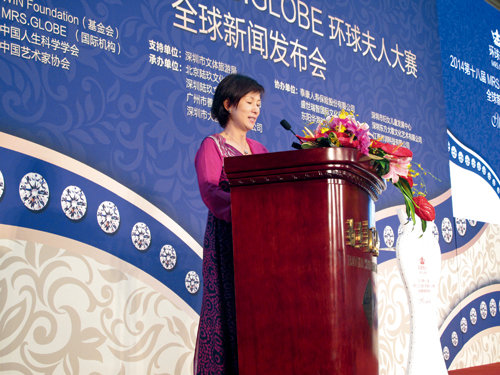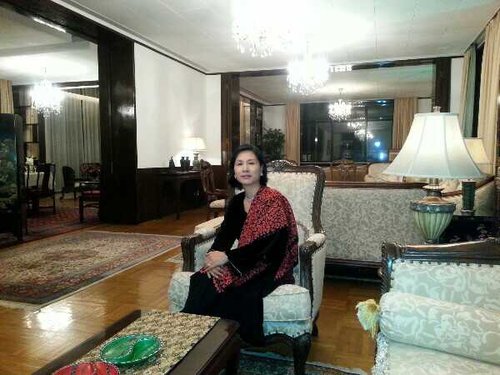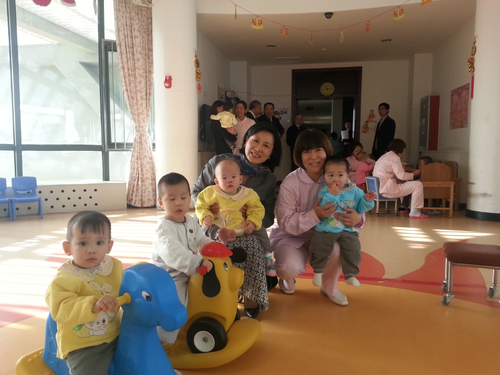Looking to the Future
 |
| Sonia Sunghee Song [Women of China English Monthly] |
Sonia Sunghee Song moved to China in January 2013, when her husband, Masood Khalid, assumed his post as Pakistan's ambassador to China. But that was not her first trip to China, as she had visited the country nearly 10 years earlier. "It was a short trip with a group of friends. Therefore, I didn't have enough time to properly learn about Chinese society and the people," Sonia recalls. During the past year and a half, Sonia has had many opportunities to learn about China — from the perspective of a diplomat's wife.
When Sonia and her husband lived in Islamabad (capital of Pakistan), she often participated in activities hosted by the Chinese Embassy. "Our Ministry of Foreign Affairs and the Chinese Embassy used to organize various activities, on occasions such as International Women's Day. By taking part in the functions, I had opportunities to interact with Chinese women, which gave me insight into their culture," says Sonia.
What is her impression of Chinese women? "(They) generally work hard, and they take pride in their work. They offer great views regarding their cultural traditions, social values and family ethics. They are courteous. They retain their Oriental values well, despite Chinese society's rapid development toward modernity. In some other societies, I have seen how sudden social advancement has made people more materialistic and indifferent. In China, I hope women continue to retain their virtues and traditions, even in the wake of their fast-developing society."
Sonia says Pakistani women, like Chinese women, work hard, whether they live in an urban or rural area. Well-educated Pakistani women tend to be zealous about reaching their professional goals, regardless whether they work abroad or in their home country. "We have women who serve as ambassadors and diplomats. We have women pilots in the Pakistan Air Force. Many Pakistani women work in international organizations, such as the United Nations, the World Bank or the International Monetary Fund. In addition, there are many female doctors and professors in renowned universities, at home or abroad," Sonia explains.
Pakistani and Chinese women have various talents in common. For example, women from both countries are renowned for their craft-making skills. "It is sometimes breathtaking when I see Chinese women's great embroideries and/or paintings displayed in museums, art galleries or markets. Pakistani women's embroideries and handmade painted potteries are admired by people from all over the world," Sonia says.
She expected to live a faster pace of life in China compared with the other countries in which she has lived. As she recalled her first year in China, as the Pakistani ambassador's wife, Sonia said each day passed quickly as if in the blink of her eyes. "We arrived at the beginning of a period when China was about to boost its great national rejuvenation. Therefore, our first year was full of activities and engagements," she recalls.
Given her busy daily schedule, Sonia has not had many opportunities to tour places of interest in China. During the past spring, she visited the birthplace of China's greatest philosopher, Confucius, and she was impressed by that trip. "While I was visiting his tomb, my mind was enlightened by the core virtues of Confucius' teachings; righteousness, selflessness and humaneness," Sonia says.
She cherishes the historical and cultural treasures of both Pakistan and China. "The two countries have had a strong connection throughout history," she says. "China's Buddhist culture was rooted in the Gandhara region, in Pakistan. The relationship between ancient China and the Gandhara region dates back almost 2,000 years.
"Around the 2nd century AD, the Kushan Dynasty in Gandhara and the Han Dynasty in China began cultural exchanges. During that period, many Buddhist monks traveled from Gandhara to China to spread Buddhism. Later, Buddhist monk Xuanzang traveled from China to Gandhara, on his pilgrimage," Sonia adds.
"Taxila (part of the ancient Gandhara region, now situated 32 kilometers northwest of Islamabad) was the center of a trade route between China and Rome; hence, it was like a melting pot of Eastern and Western civilizations. As merchants and craftsmen met in Taxila, to exchange their products and communicate with each other, their trading gave birth to the popularity of Gandhara art, which is now prevalent in China, South Korea and Japan."
Sonia was inspired by a conference she recently attended at Renmin University in Beijing. The conference included discussions about the construction and future of the "Silk Road Economic Belt." (During his visit to Central Asia in September last year, Chinese President Xi Jinping proposed the idea of the "Silk Road Economic Belt." The aim is to facilitate trade and investment and improve traffic connectivity, trade and monetary cooperation and people-to-people exchanges between China and central and western Asia.)
"The goal of achieving a 'win-win' situation, communications among nations with different civilizations and economies, sharing values, building mutual trust, advancing cooperation, combating terrorism, removing poverty, restoring peace and diplomacy, all concepts addressed by speakers during the conference were mentioned in a book, The China Dream, written by professor Li Shikang, from Tsinghua University, which I recently read," Sonia says.
Sonia believes the revival of business and cooperation along the Silk Road, and the realization of China's "national dream," will help build global peace and stability. "I would like to imagine China's role in the world as a mother's role for mankind. The mother should be healthy, stable and prosperous, so she will be able to look after her children. I hope the country's great 'national dream' and its 'win-win' policy will eventually bring prosperity, peace and stability to the world," she adds.
 |
|
Sonia Sunghee Song (L2), her husband and their two children [Women of China/He Qiuju] |
 |
|
Sonia Sunghee Song [Women of China/He Qiuju] |
 |
|
Sonia Sunghee Song at an orphange [Women of China/He Qiuju] |
(Source: Women of China English Monthly October 2014 Issue)
Please understand that womenofchina.cn,a non-profit, information-communication website, cannot reach every writer before using articles and images. For copyright issues, please contact us by emailing: website@womenofchina.cn. The articles published and opinions expressed on this website represent the opinions of writers and are not necessarily shared by womenofchina.cn.
 京公网安备 11010102004314号
京公网安备 11010102004314号